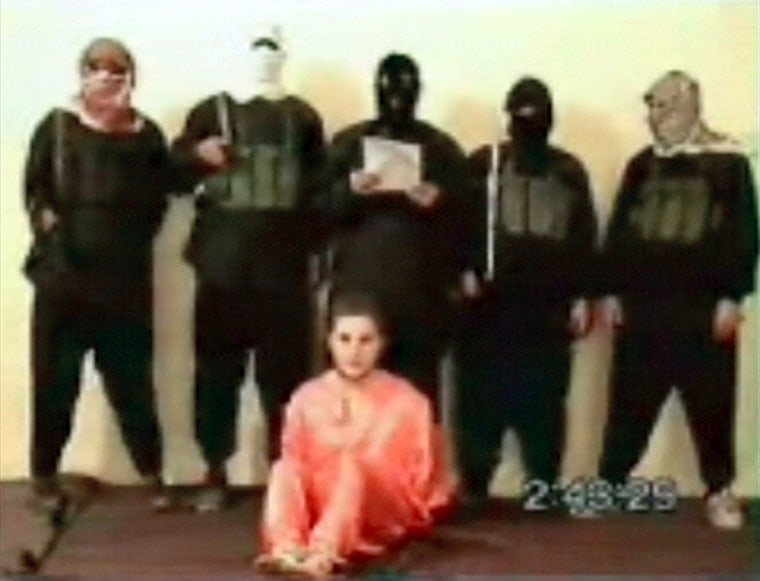At least four people suspected of being involved in the abduction of Nicholas Berg, the American civilian who was later beheaded, were arrested and Iraqi police believe a nephew of Saddam Hussein was involved, U.S. and Iraqi officials said Friday.
An Iraqi security official, who spoke with the Associated Press on condition of anonymity, said four former members of Saddam Hussein’s Fedayeen paramilitary organization were arrested a week ago at a home in an area north of Baghdad.
Shortly after that report, Brig. Gen. Mark Kimmitt, the chief U.S. military spokesman in Iraq, told reporters that four men suspected of involvement in Berg's death were detained in a raid Wednesday, and that two had since been released.
It was not clear if those four were the same individuals cited by the Iraqi official has having been detained last week.
U.S. officials in Baghdad told NBC News that they believe Berg was abducted by one group and then "sold" to a second group that killed him. That group, which the CIA believes includes Jordanian extremist Abu Musab al-Zarqawi, is still at large.
Saddam nephew said to have been ringleader
The Iraqi source interviewed by the AP said those arrested were led by Yasser al-Sabawi, a nephew of Saddam's. The source added that American intelligence had asked Iraqi authorities to hand over the suspects, but they were still in Iraqi hands.
Al-Sabawi was not among those arrested, the Iraqi official said. Separately, a U.S. source told NBC News that the "primary target" of the raid was not captured.
Police intelligence agents arrested the suspects on May 14 as they arrived at the home in Salaheddin province, which includes Tikrit, Saddam's hometown, the official said. The meeting was planned to “plot other major operations,” the official said without elaborating.
Four suspects had arrived early for the meeting and were inside the house, waiting for a fifth associate who escaped arrest, he said. It was not immediately clear if the fifth persion was al-Sabawi or another alleged conspirator.
Police seized weapons and explosives at the site, the Iraqi official said, adding that the informant who tipped off authorities was killed by unidentified gunmen the day after the arrests.
Berg’s body was found in Baghdad on May 8. He had been decapitated and his murder was videotaped and posted on an Islamic Web site. The murderers said his killing was in response to the abuse of Iraqis at Abu Ghraib prison.
The video clip was titled “Sheikh Abu Musab al-Zarqawi slaughters an American infidel with his own hands.” Al-Zarqawi is an extremist whose group is thought to sometimes work with Osama bin Laden's al-Qaida group.
Dispute over detention
Berg, who was 26, had gone to Iraq to try to get work as a telecommunications worker.
Berg vanished on April 10 after leaving his hotel. He returned shortly after three weeks of detention in northern city of Mosul that are the subject of conflicting claims by U.S. officials and family members.
The U.S.-led occupation authority says that the FBI visited Berg three times after Iraqi police arrested him but that he was never in U.S. custody.
Berg’s father, Michael, rejected claims that his son had not been in U.S. custody. “I have a written statement from the State Department in Baghdad ... saying that my son was being held by the military,” Michael Berg said in a radio interview last week.
To back that claim, the family showed the AP an e-mail message dated April 1 from Beth Payne, the U.S. consular officer in Iraq.
“I have confirmed that your son, Nick, is being detained by the U.S. military in Mosul. He is safe. He was picked up approximately one week ago. We will try to obtain additional information regarding his detention and a contact person you can communicate with directly,” said the message, which was provided to the Associated Press.
Attorney General John Ashcroft confirmed that FBI agents questioned Berg in Mosul. He said agents discovered that Berg had previously been investigated by the FBI in 2002 after an e-mail address traced to him was used by an unidentified person believed to be acquainted with Zacarias Moussaoui.
Moussaoui, who is charged with conspiracy in connection with the Sept. 11, 2001, attacks in the United States, attended the University of Oklahoma at the same time as Berg.
The link turned out to be baseless, Ashcroft said last week. “There was no inappropriate involvement in terror,” he said. “It is not uncommon for people to allow their computers to be used by others in university settings.”
E-mail to parents
Other U.S. officials said Iraqi police arrested Berg in Mosul on March 24 because they believed he may have been involved in “suspicious activities.”
Berg, for his part, told friends that he was arrested in Mosul because he had an Israeli stamp in his passport.
Berg confirmed that U.S. investigators visited him in Mosul, telling his parent in an e-mail message that was given to The New York Times that federal agents had questioned him about whether he had ever built a pipe bomb or had been in Iran.
The police chief in Mosul, Maj. Gen. Mohammed Khair al-Barhawi, said his department never arrested Berg and that he had no knowledge of the case.
Ashcroft said FBI agents and officials of the U.S.-led coalition in Iraq encouraged Berg to accept a U.S. offer to arrange safe passage out of Iraq, but he declined it.
Moreover, Ashcroft said, when Berg was released by the Iraqi police, "he refused government offers to advise his family and friends of his status.”
